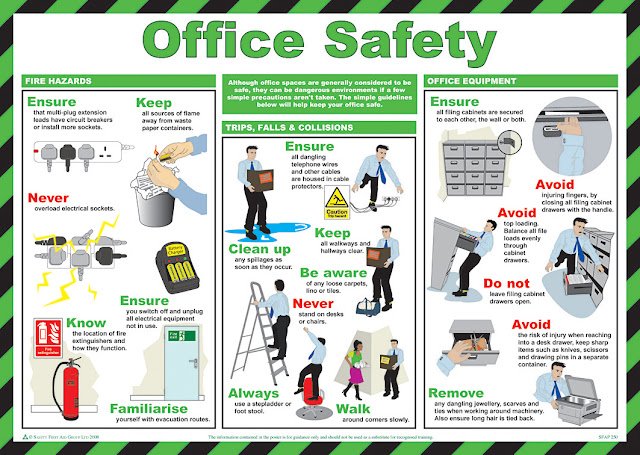
Are offices unsafe? The answer is no, but only if you have the right attitudes towards safety. Unfortunately, thousands of office workers suffer disabling injuries every year due to negative attitudes and habits. In this toolbox talk, we will discuss Office Safety & some of the most common attitudes that set the stage for accidents and provide tips on how to avoid slips, trips, falls, and fire hazards in the office.
Negative Attitudes and Habits that Lead to Accidents
The following attitudes and habits can be dangerous and lead to accidents:
- Overconfidence: “It could never happen to me.”
- Laziness: “It’s just too much trouble to do it the right way.”
- Stubbornness: “I’ll do it my way.”
- Sarcasm: “Safety is kid’s stuff.”
- Forgetfulness: “I meant to, but I forgot.”
- Carelessness: “Oh, why bother?”
- Showing off: “No problem, watch me.”
- Impatience: “It’ll take me all day if I do it the safe way.”
- Ignorance: “I didn’t know it was flammable.”
How to Avoid Slips, Trips, and Falls – Office Safety
Slips, trips, and falls are one of the most common causes of injuries in the workplace. Here are some tips on how to avoid them:
- Keep all legs of your chair on the floor. Tilting back in a chair often results in overbalancing and falls.
- Leaning sideways from the chair to pick up objects on the floor is dangerous.
- Fill bottom file cabinet drawers first to prevent the cabinet from toppling.
- All file drawers must be closed immediately after use.
- Only one file drawer in the cabinet should be opened at a time to prevent the cabinet from toppling over.
- Avoid overloading top drawers. This can cause the cabinet to fall on you.
- Climbing on open file drawers must be forbidden.
- Watch out for polished floors, stairways, loose carpeting, floorboards, and tiles.
- On stairways, use handrails and take one step at a time.
- Watch out for wet floors and spillage.
- Pick up pencils, paper clips, and other objects that might cause a trip.
- Learn proper lifting techniques.
- Avoid obstructing your vision with large loads. Don’t hurry, especially around corners.
- Don’t store boxes, etc., where people might trip.
- Beware of telephone and electrical leads lying across the floor. Catching your heel on a lead almost guarantees a fall.
- Practice good housekeeping and store sharp and pointed objects separately.
Life-Saving Rules of Fire Safety
Fires can be disastrous in any workplace, so it’s essential to follow these life-saving rules of fire safety:
- If you must smoke, do so at designated areas only.
- Dispose of matches, ashes, and cigarette butts in proper receptacles.
- Properly store and dispose of all materials that may be fire hazards, including cleaning fluids, photocopier inks, and oily or solvent-soaked rags.
- Use caution when operating electrical appliances. Turn them off when they are not in use.
- Never overload circuits and extension cords.
- Learn the procedures for evacuation, reporting fire, and emergencies.
emergency evacuation procedures are critical for the safety and well-being of everyone involved in a workplace or site. It is crucial to have a well-defined emergency response plan in place to ensure a swift and efficient response to any emergency situation.
Conclusion
In conclusion, safety in the office is everyone’s responsibility. By developing the right attitudes towards safety and following the tips provided, we can avoid accidents and injuries in the workplace. Remember, a safe workplace is a happy workplace!
